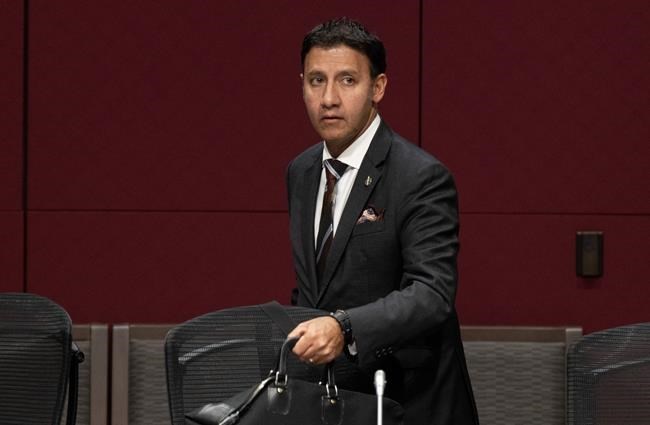OTTAWA — The head of the Ontario Provincial Police believes one of his young constables would still be alive had the Liberals' bail-reform legislation been law, he told a Senate committee Thursday.Â
But associations representing Black and Indigenous lawyers warned senators there is a lack of evidence to support how the proposed reforms would make neighborhoods safer.Â
And they assert that a mountain of research shows far too many Black, Indigenous and otherwise marginalized people are already behind bars — a problem they say the legislation could worsen.Â
OPP Commissioner Thomas Carrique appeared before a Senate committee studying Bill C-48, the Liberals' proposed bail-reform package.
He told senators he believes the slaying of Const. Greg Pierzchala could have been prevented had his accused killer been in custody.
"I do believe wholeheartedly that this bill, if applied as intended, would have prevented (his) death."Â
The shooting death of the 28-year-old constable last December renewed calls from police leaders like Carrique for lawmakers to enact tougher up access to bail for violent, repeat offenders.Â
The federal Conservatives also pressed Prime Minster Justin Trudeau to take action and within weeks, the premiers of all provinces and territories demanded reforms.Â
Court documents show that Randall McKenzie, one of two people charged with first-degree murder in Pierzchala's killing, had been initially denied bail on separate assault and weapons charges, but was later released after a review. A warrant had been issued for his arrest after he failed to show up for a court appearance.Â
The Liberal bill proposes expanding reverse-onus provisions to offences involving a weapon, including certain types of firearms, as well as to those related to intimate partner violence convictions or even discharges.
A reverse onus shifts the burden off of Crown prosecutors from having to prove to a provincial judge why an accused person should be kept in detention while they are awaiting a trial. Instead, accused people would have to show why they should be released into the community.
A representative from the Canadian Association of Chiefs of Police applauded the Liberal bill as much-needed during Thursday's hearing.Â
But its measures have caused concern for civil liberties organizations, criminal lawyers and groups such as the Indigenous Bar Association and the Canadian Association of Black Lawyers. Â
Christa Big Canoe, a member of the Indigenous lawyers' group, told senators that Indigenous women who are victims of domestic violence are often charged by police when an officer responds to an incident.Â
She said shifting requiring such women to prove why they should be released before trial carries the potential for harm.
"There is no empirical evidence that this bill is going to achieve the public safety goals that it aims to," said Theresa Donkor of the Canadian Association of Black Lawyers.Â
"I completely understand that when any individual life is lost that's a tragic circumstance and it's certainly something that we want to avoid. But the cases that we're seeing in the news are certainly outliers. It's not that every single person that's released on bail goes out and commits another crime."Â
Both she and Big Canoe told senators that Black and Indigenous accused people are already hugely overrepresented in Canada's jails.
Donkor warned that the Liberal government risks undermining its own efforts to address the racial discrimination that leads to such statistics.
Justice Minister Arif Virani has defended the legislation by emphasizing that its measures are specifically targeting repeat, violent offenders.
During testimony at the Senate committee earlier this week, Virani pointed to support for the bill from provinces and police leaders and encouraged the Senate to pass it quickly.
He also asked senators to take note of how the House of Commons passed the bill with unanimous consent, allowing it to proceed to the Senate without further debate or study by a committee of MPs.
On Thursday, the Senate committee discussed the bill's potential impact on Legal Aid services, since those who live in poverty and lack proper resources will have a tougher time accessing bail if the onus is on them to prove the need for their own release.Â
Boris Bytensky, a representative for the Criminal Lawyers' Association, warned that the measures could also have consequences on court resources.Â
If more people are in pre-trial detention, that could add pressure to an already overwhelmed system, he said, and lead to the withdrawal or staying of some charges if courts cannot address them in time.Â
The bill could backfire and have the opposite effect on public safety than what the government is intending, Bytensky suggested.Â
"Everybody will be waiting longer in the detention centres to get their bail hearings. And the person who may be in there for a relatively minor infraction that's been alleged will then be sitting face-to-face for a number of days with people that ... have a much lengthier criminal history," he said.
"People go in and come out much more dangerous than when they went in."Â
He added that if someone loses their job or a place in a treatment program because they are sitting in remand, "that's also going to make you more dangerous directly because of all the different stresses you're going to face in your life."Â
This report by The Canadian Press was first published Sept. 28, 2023.
Stephanie Taylor, The Canadian Press




